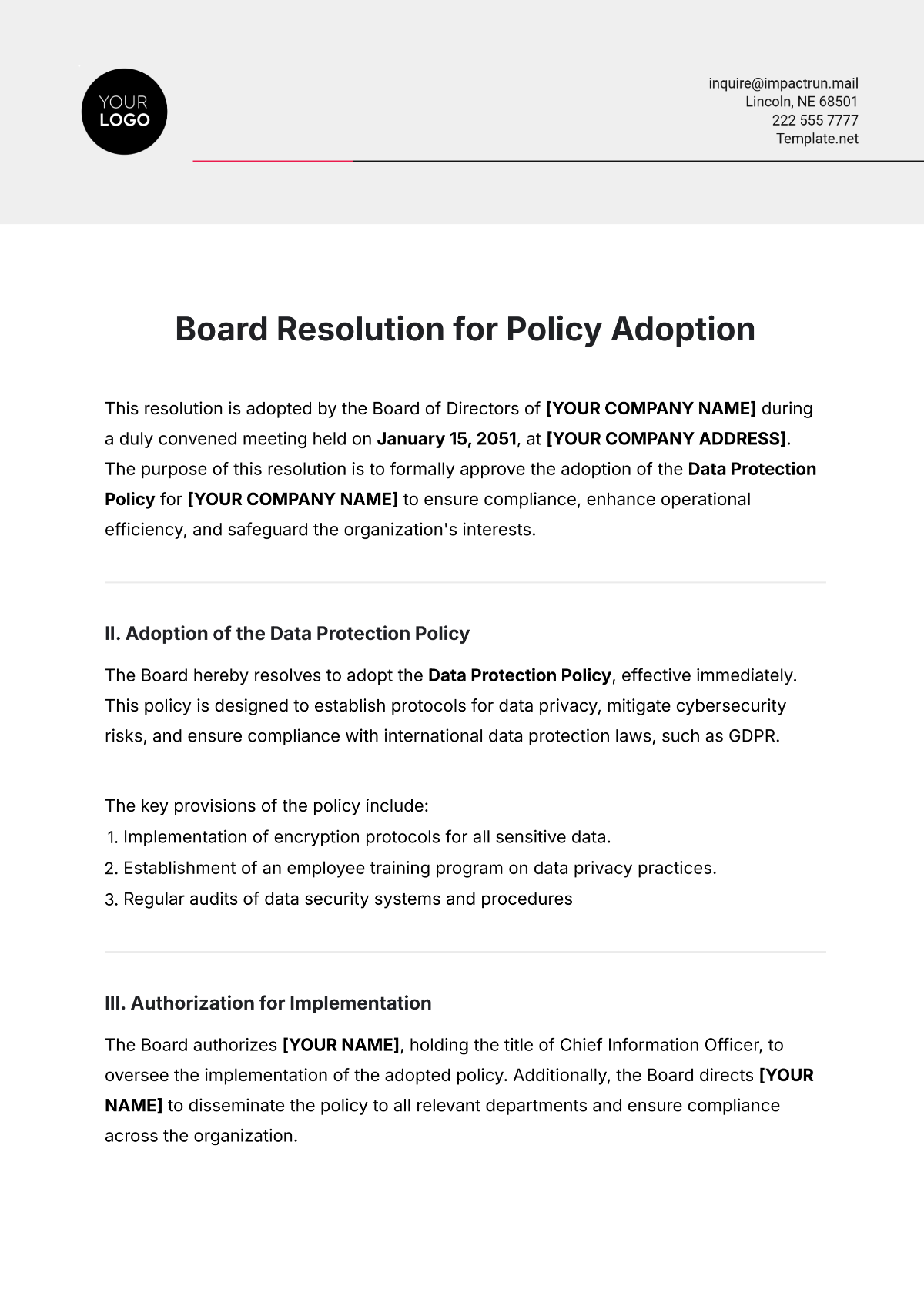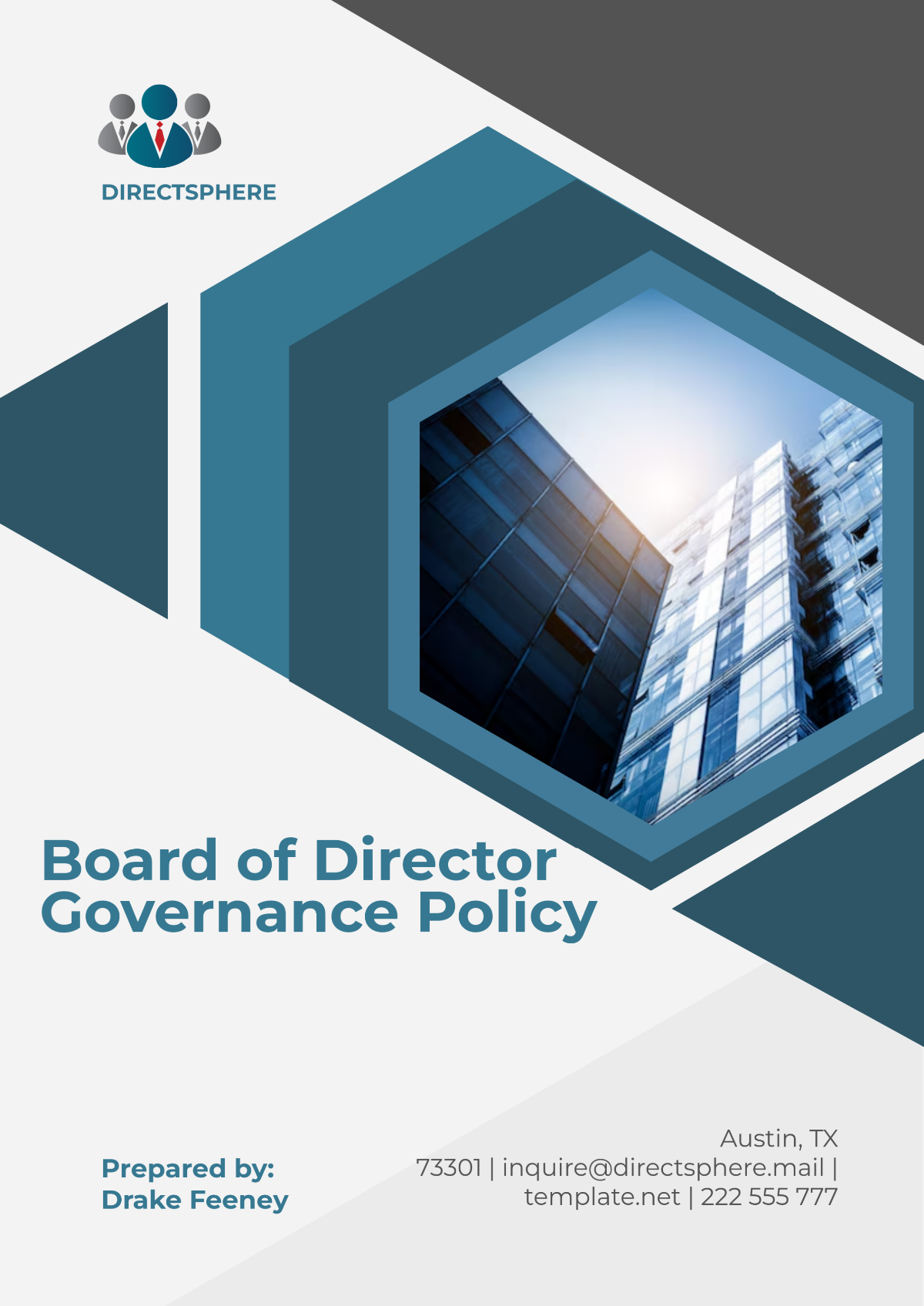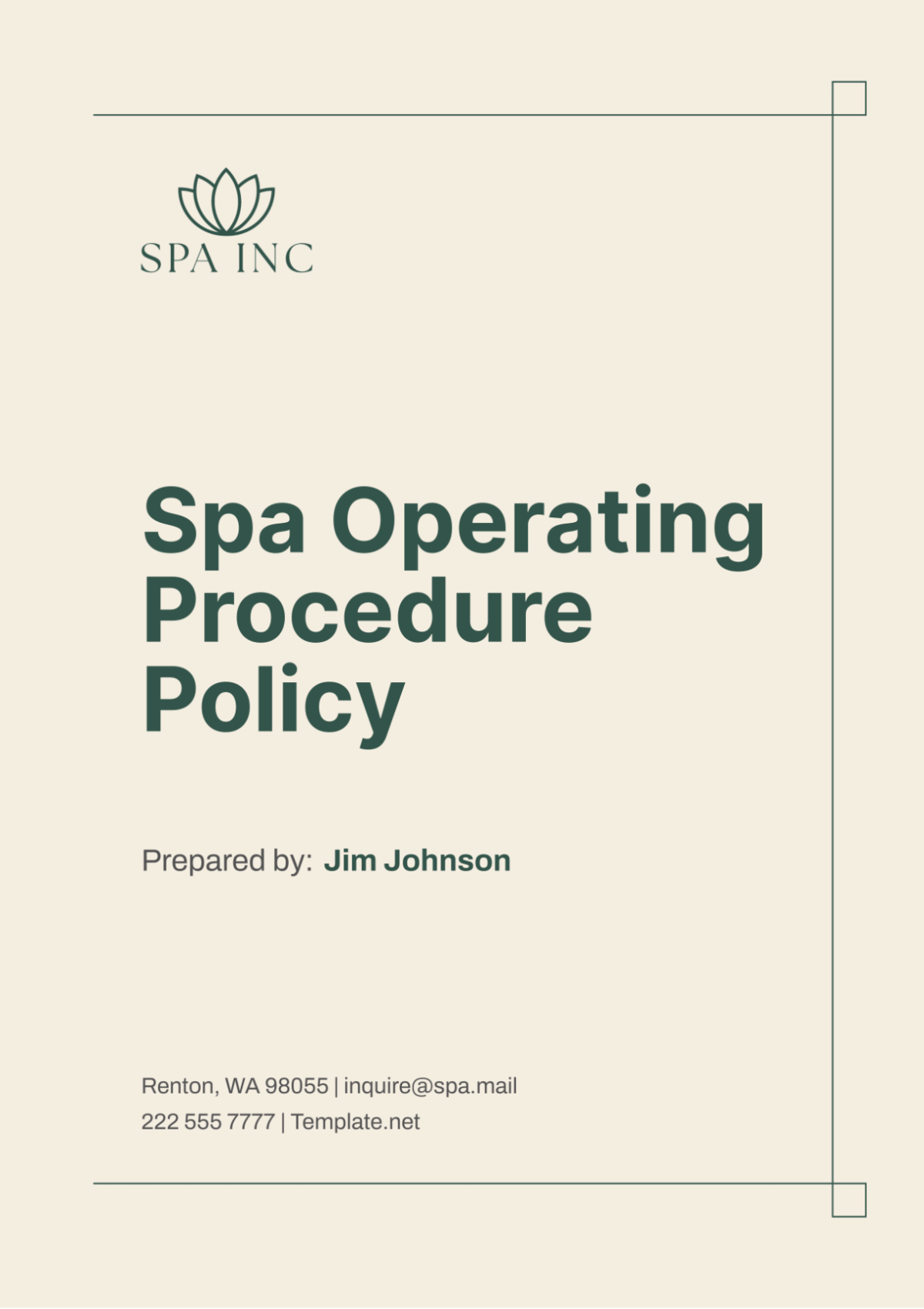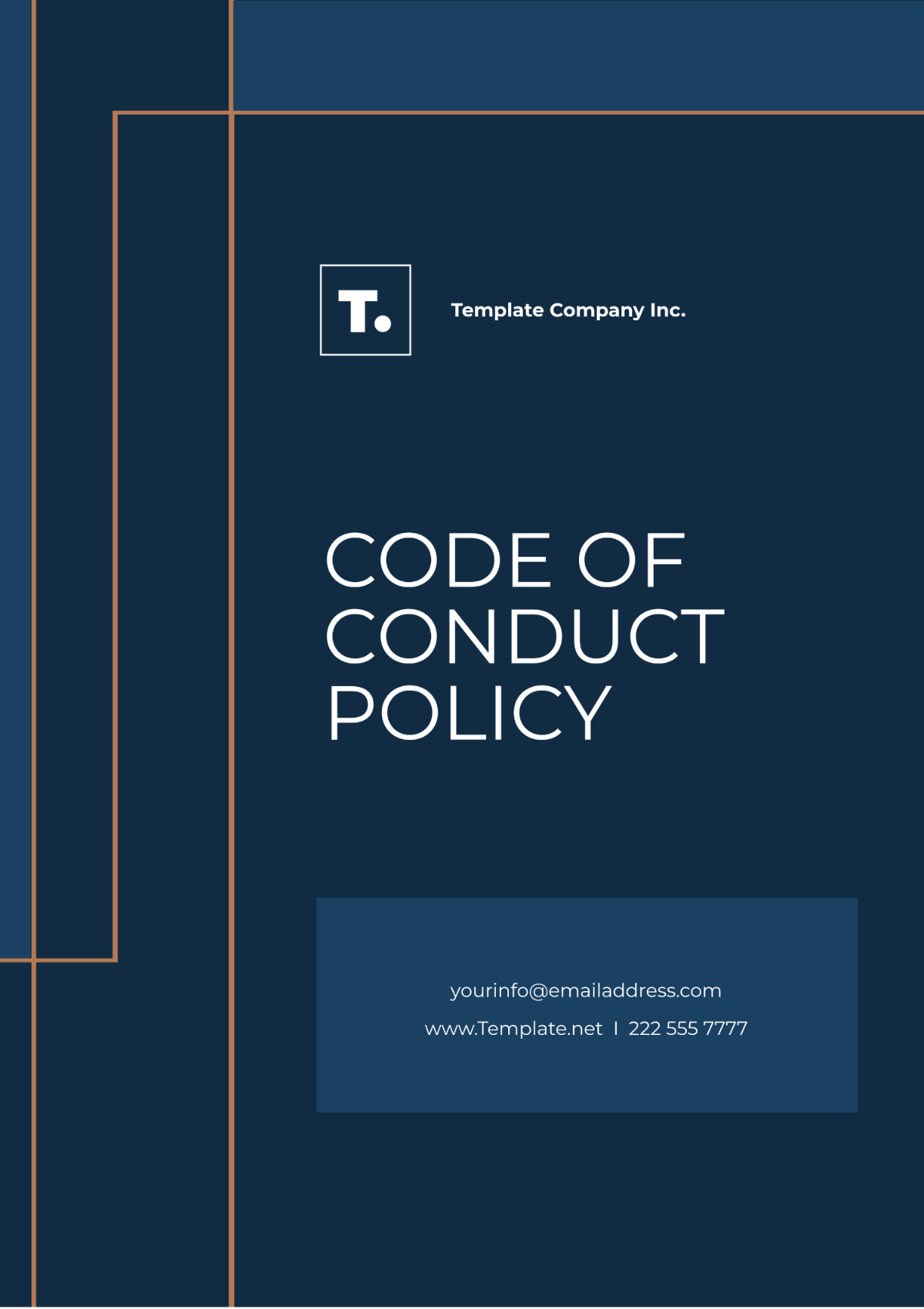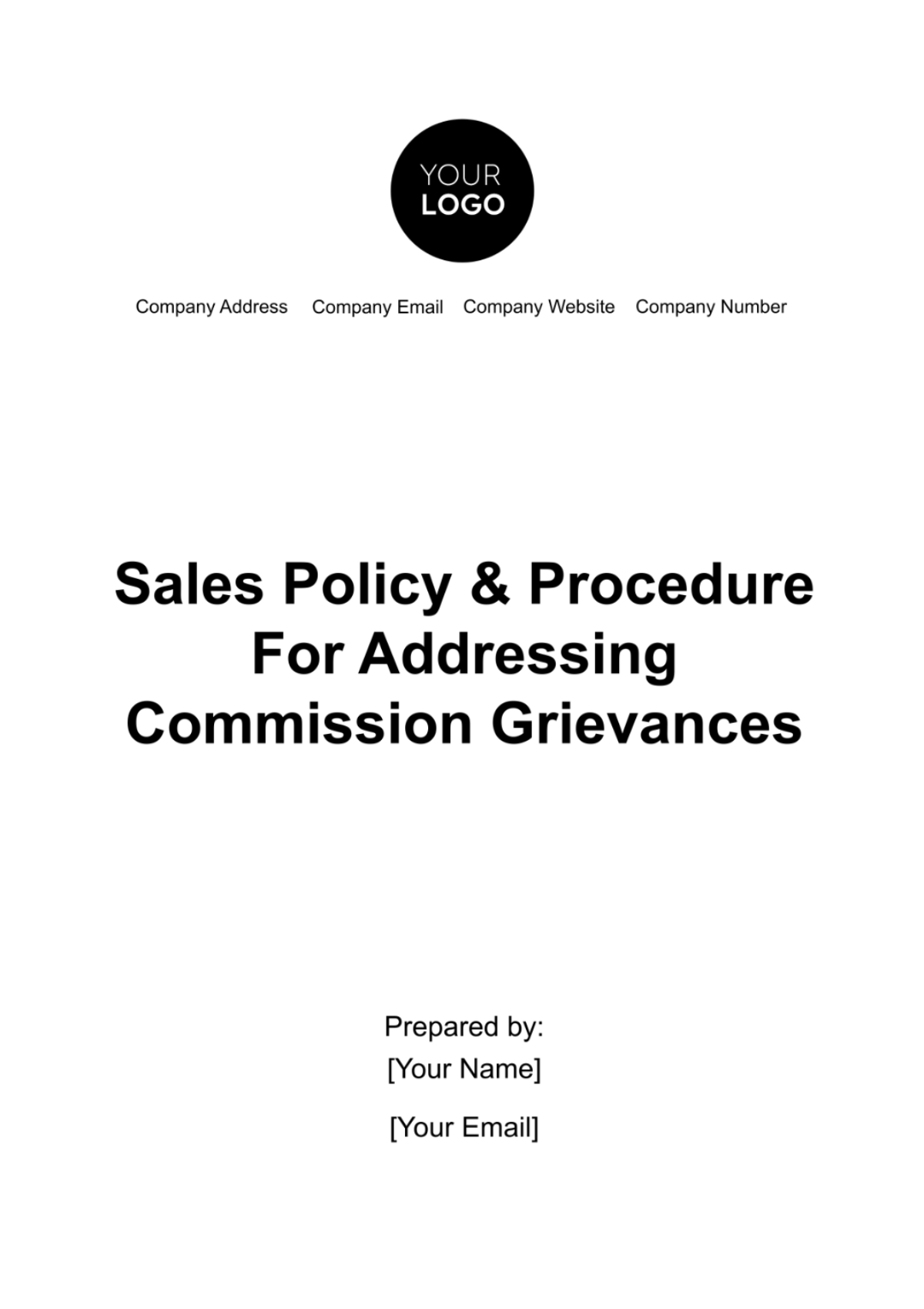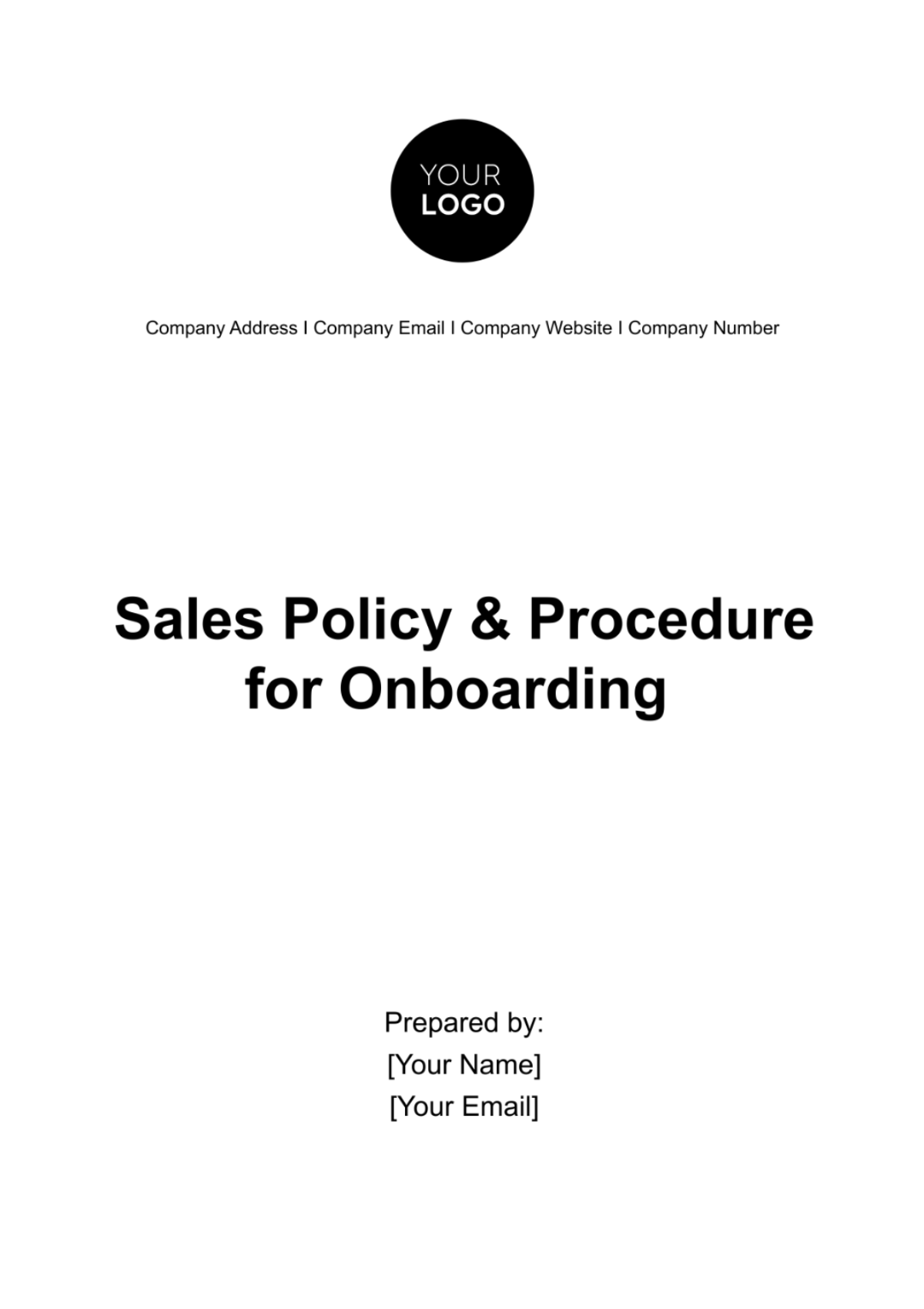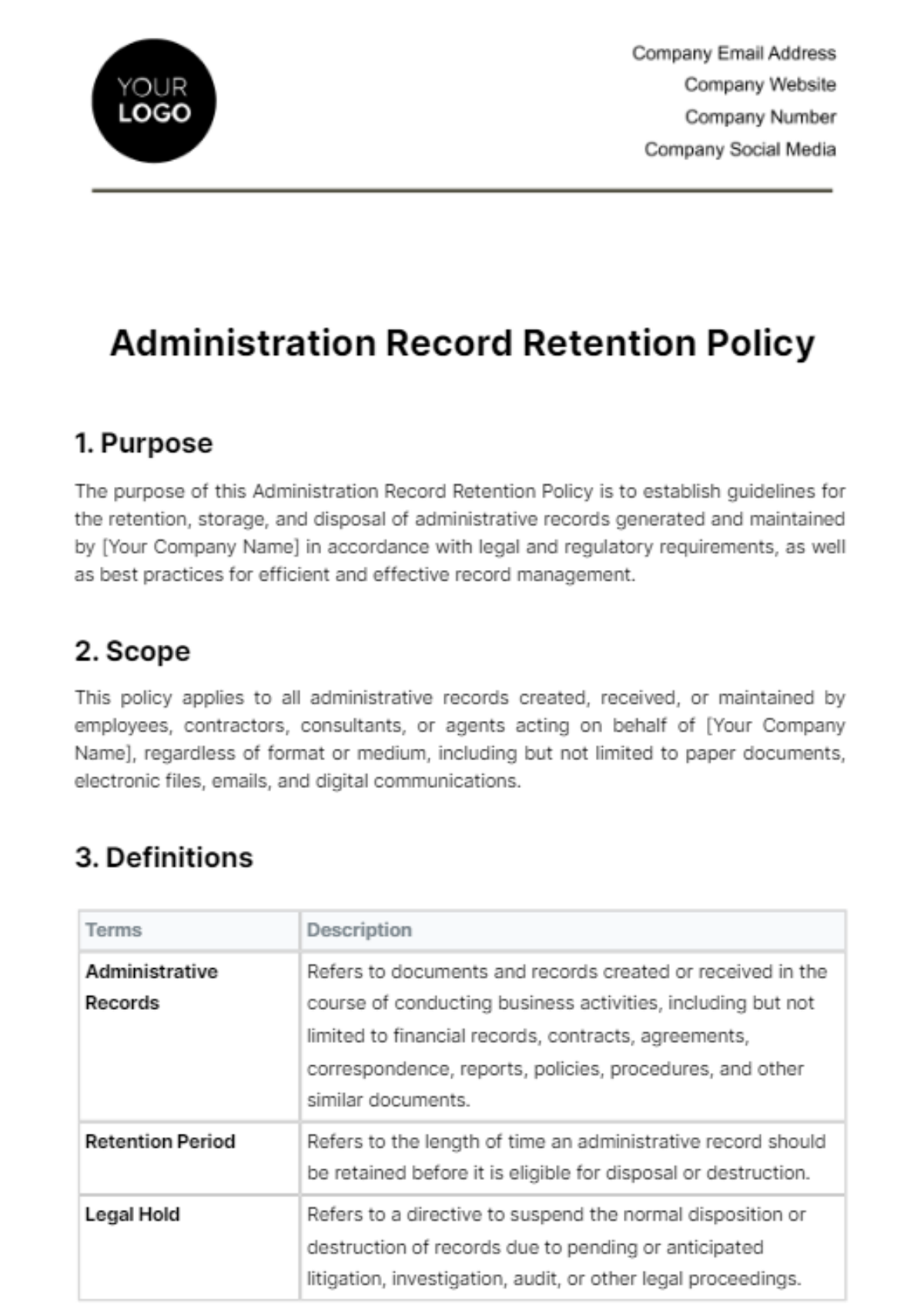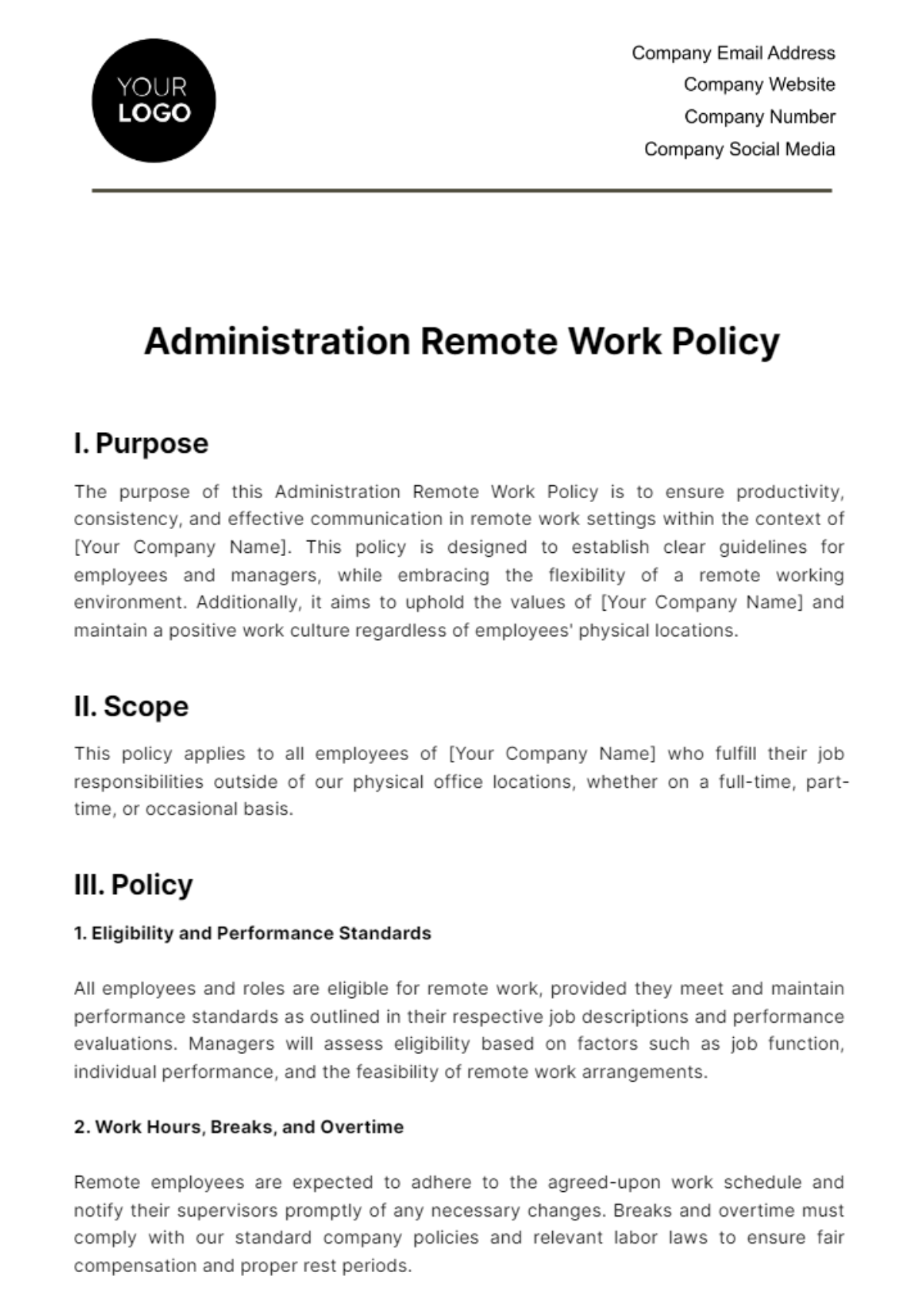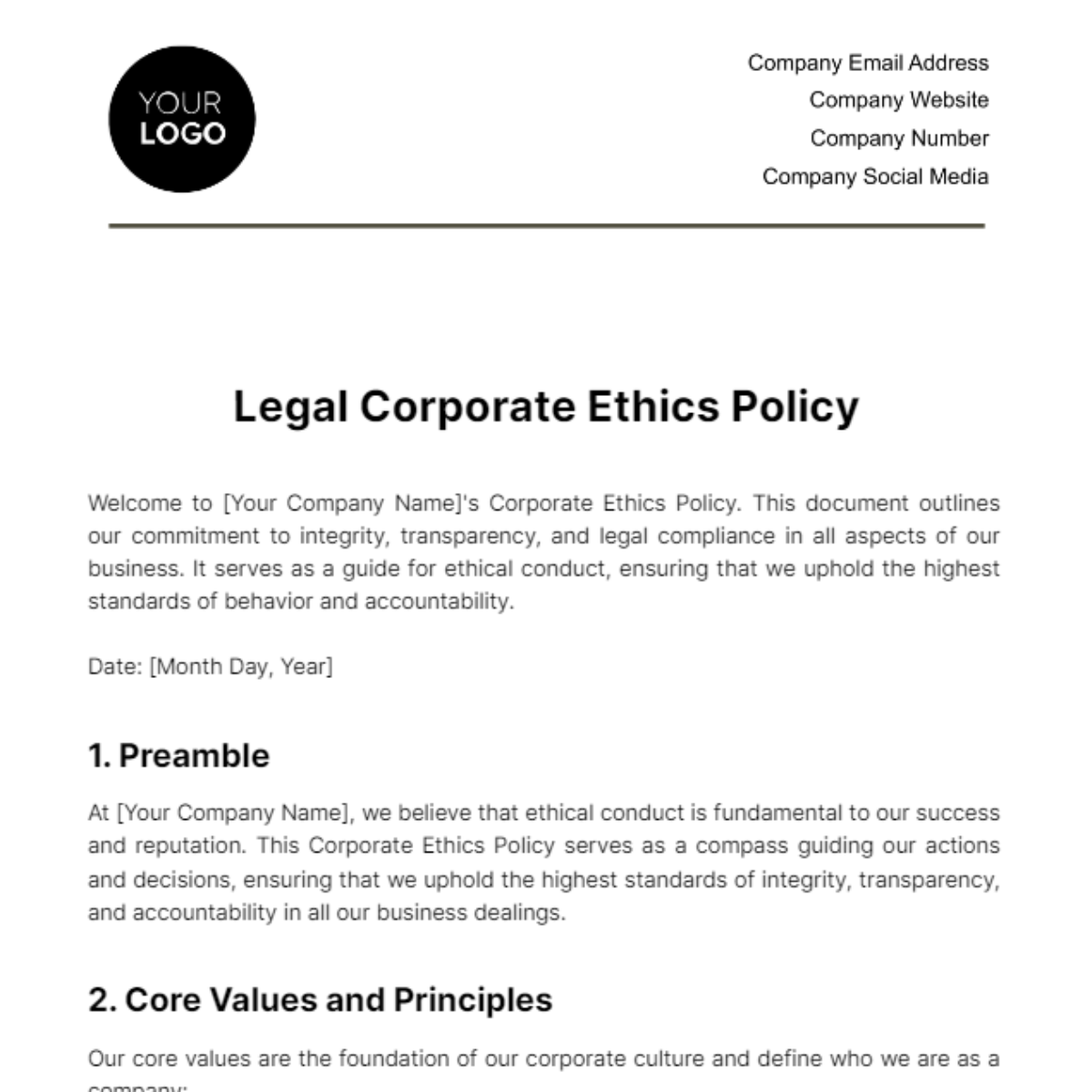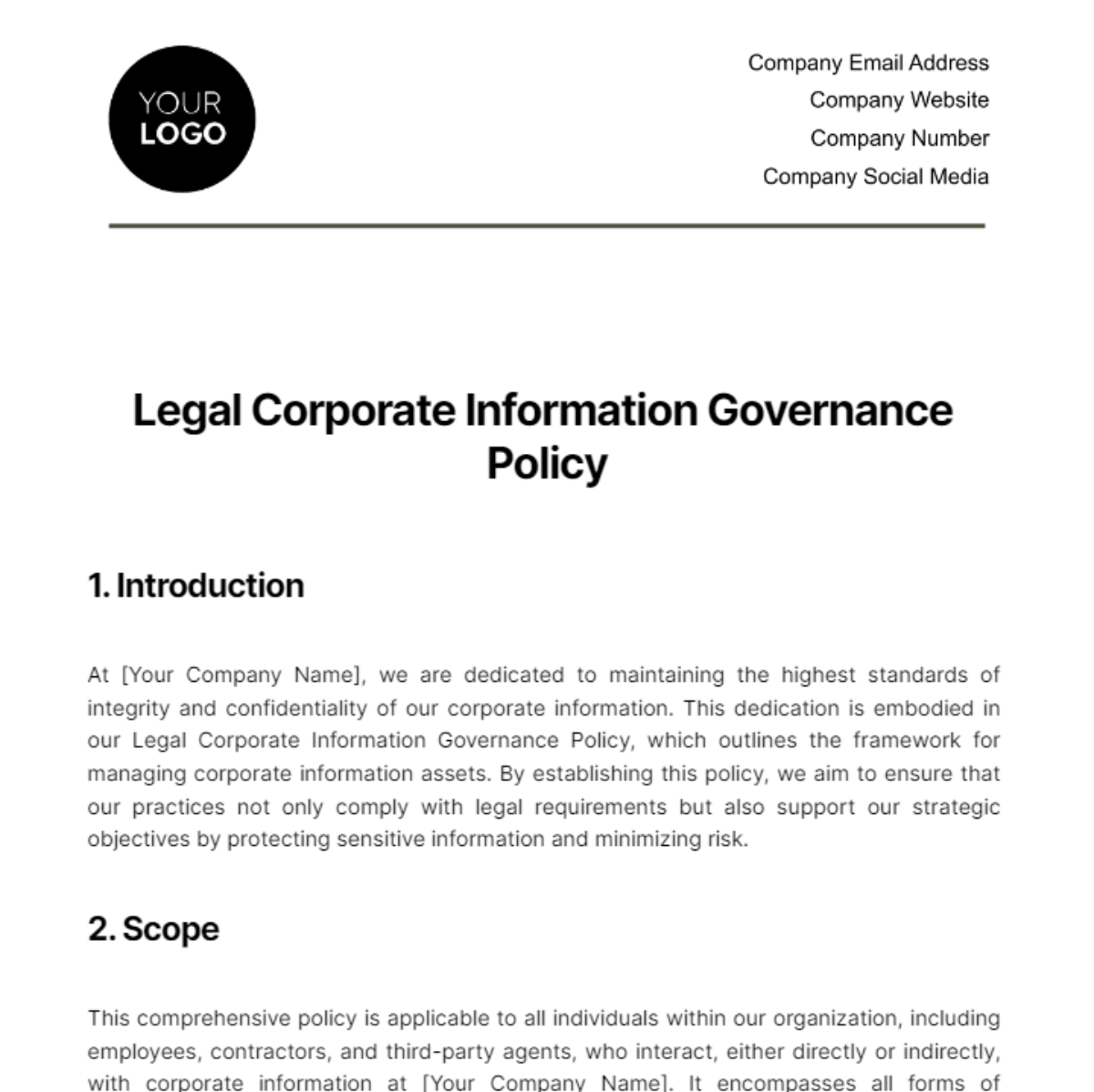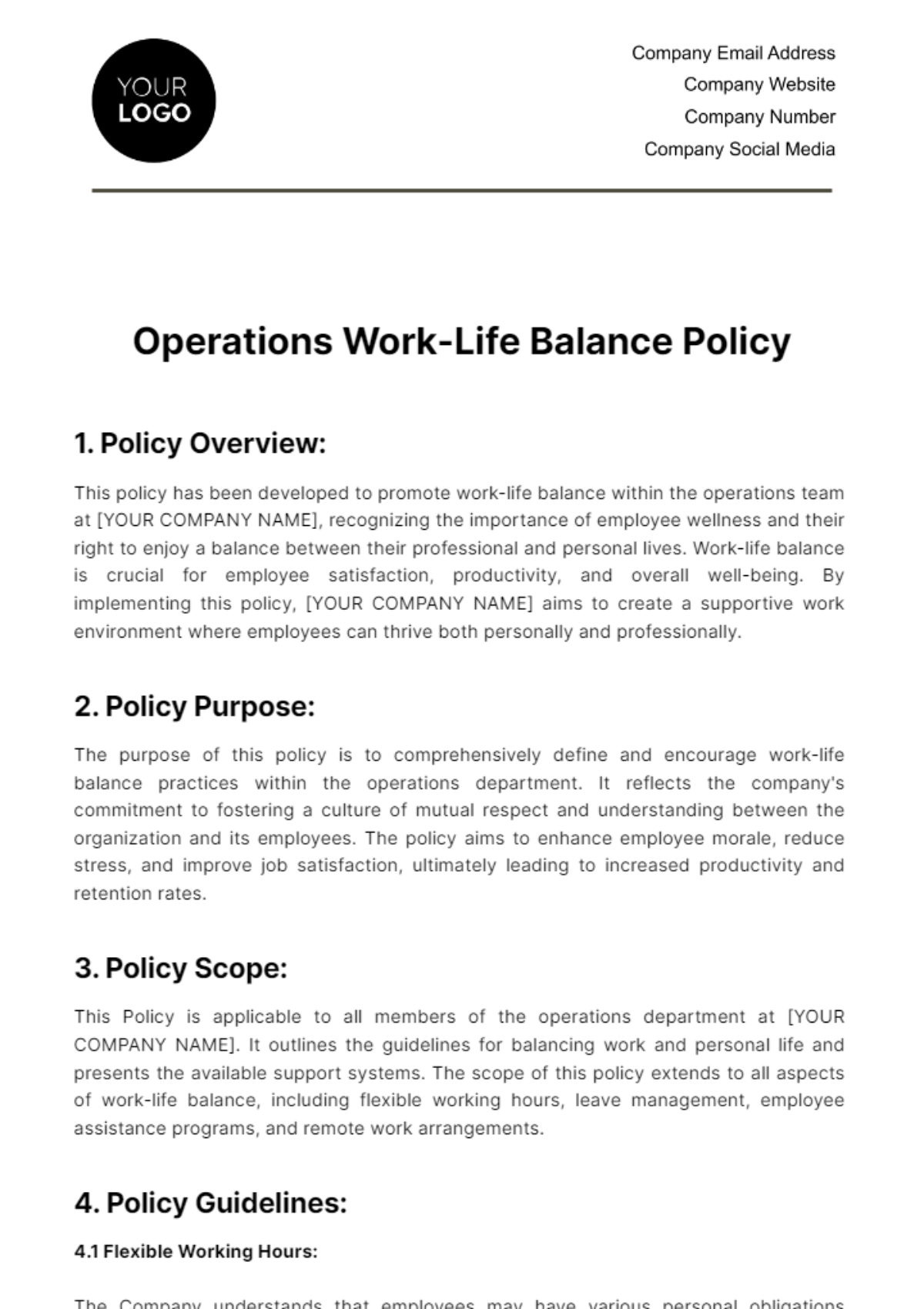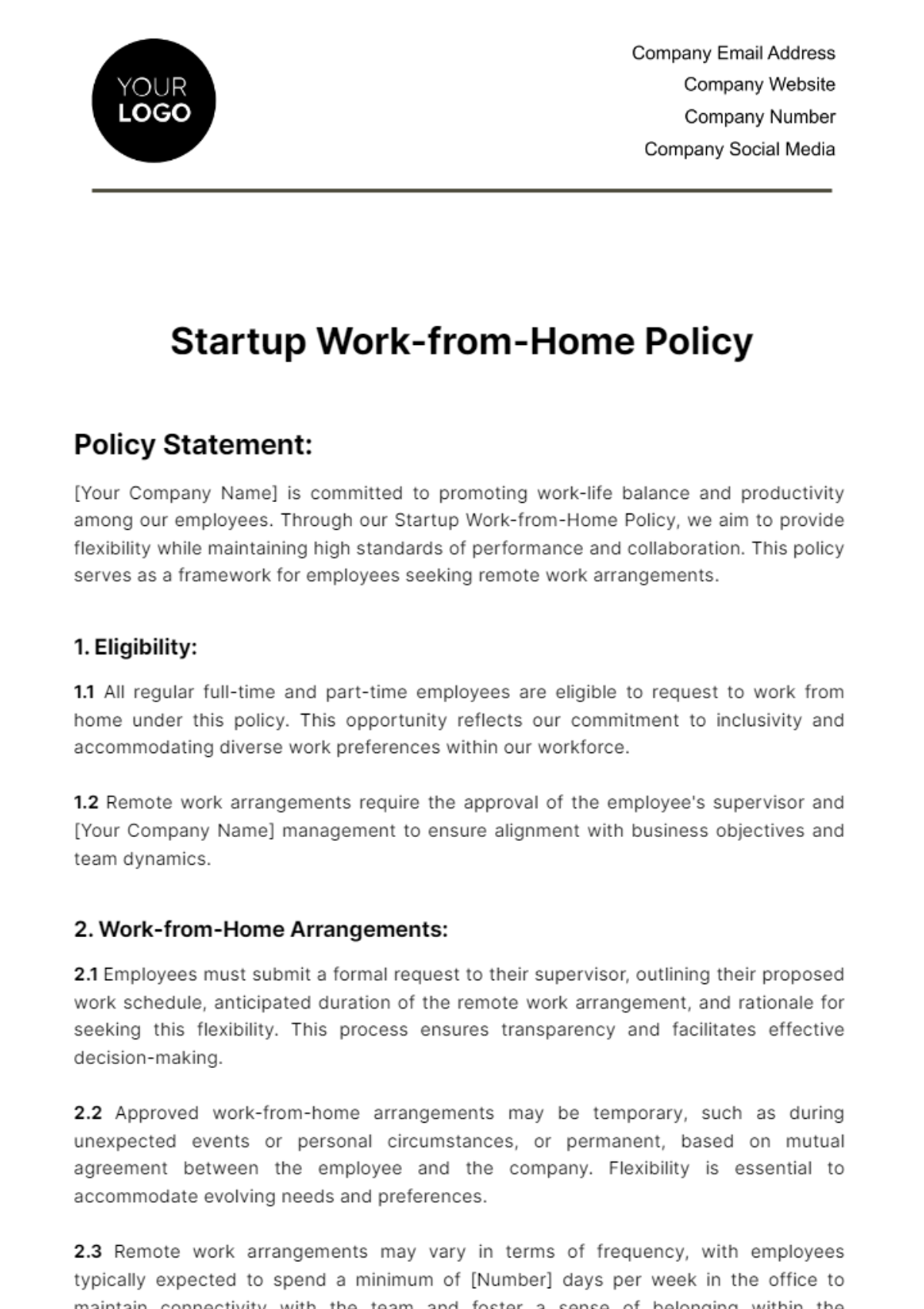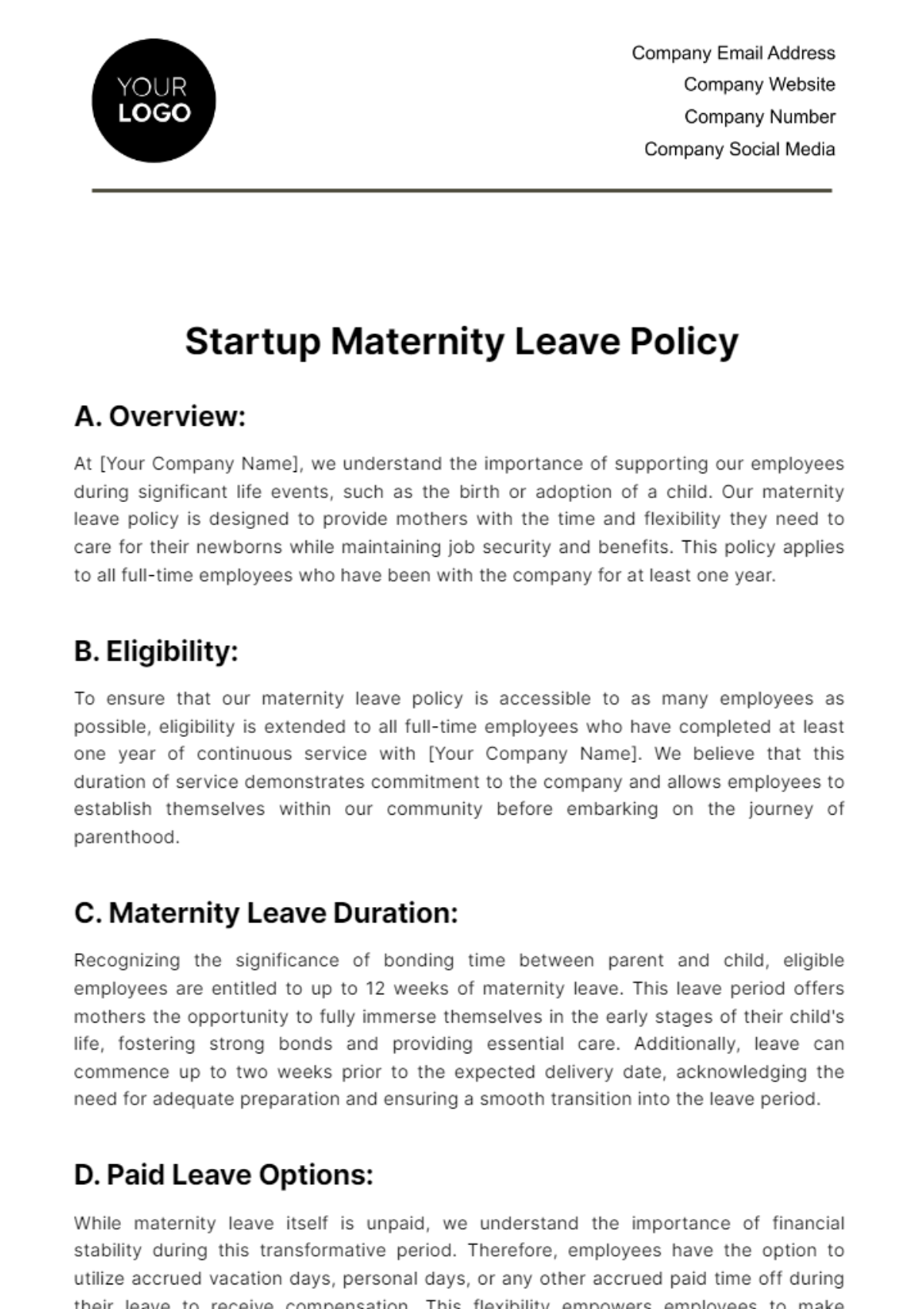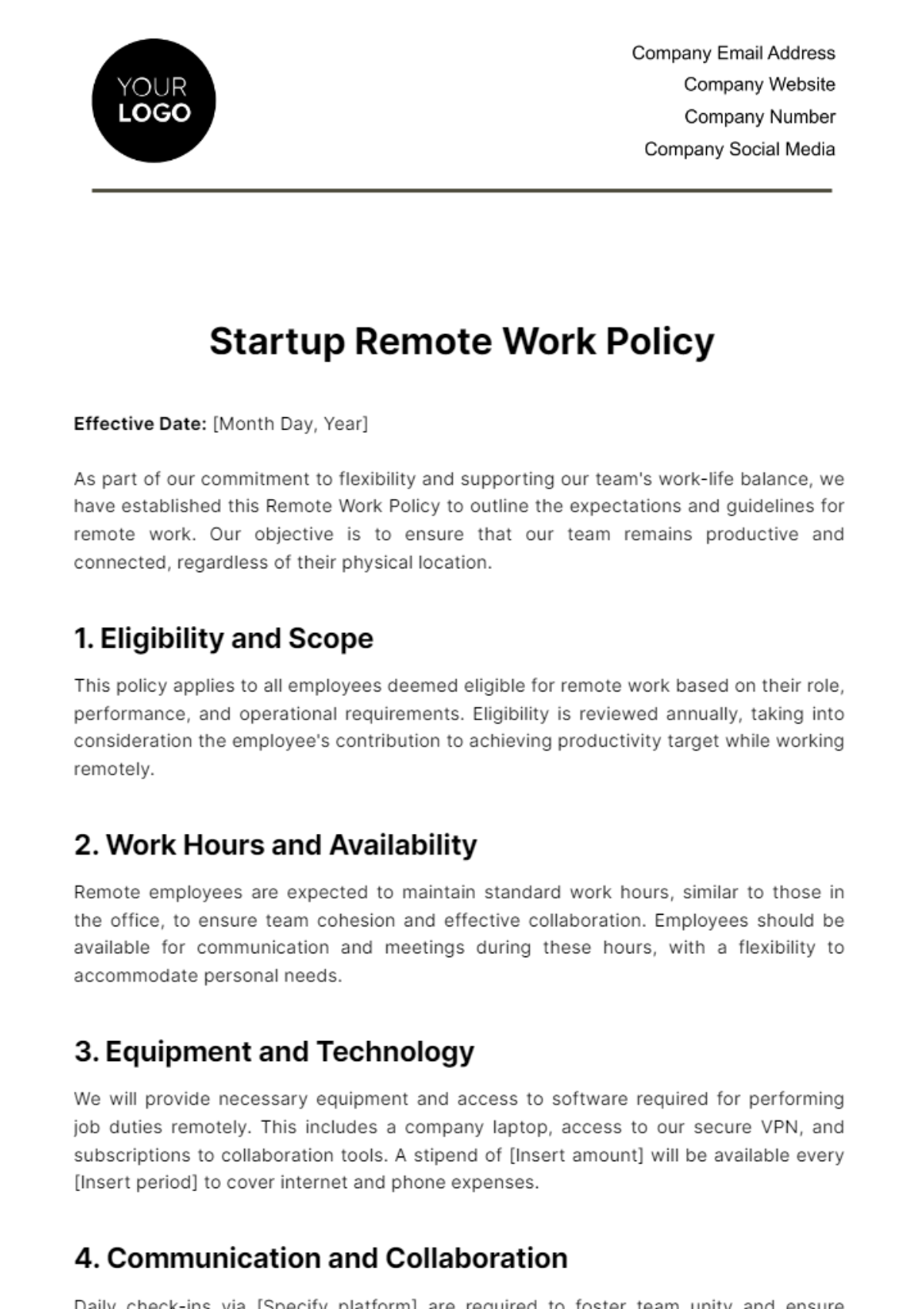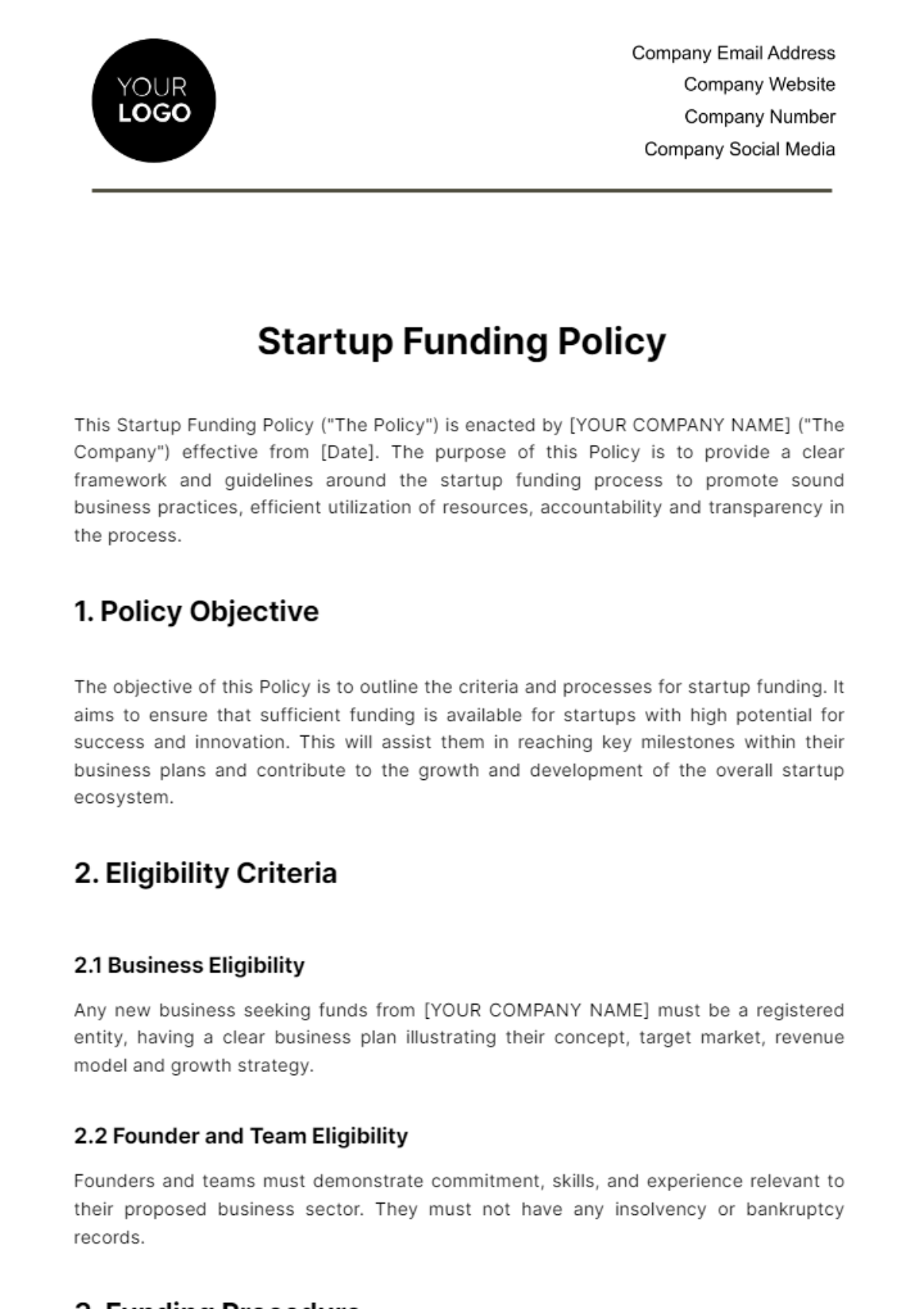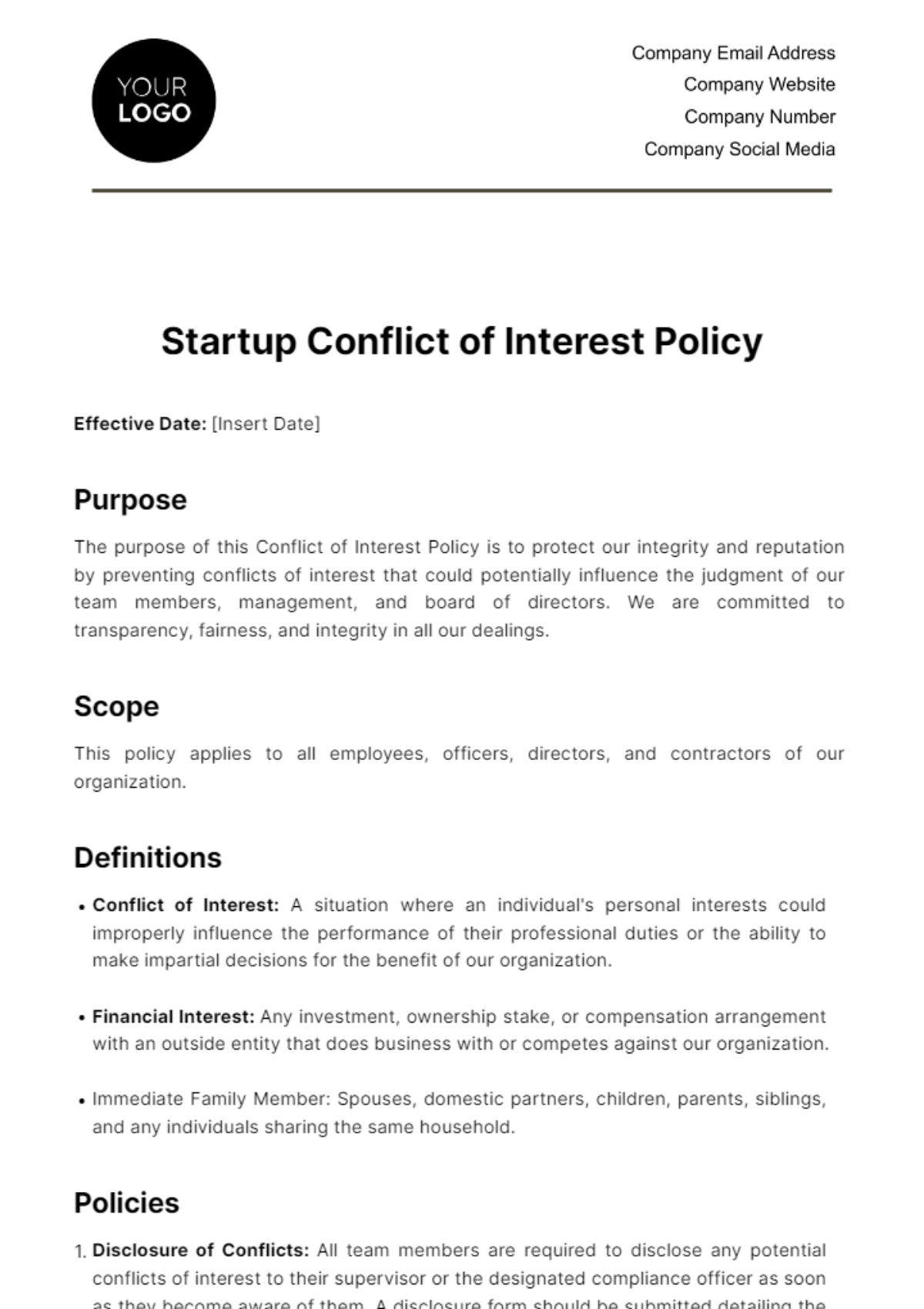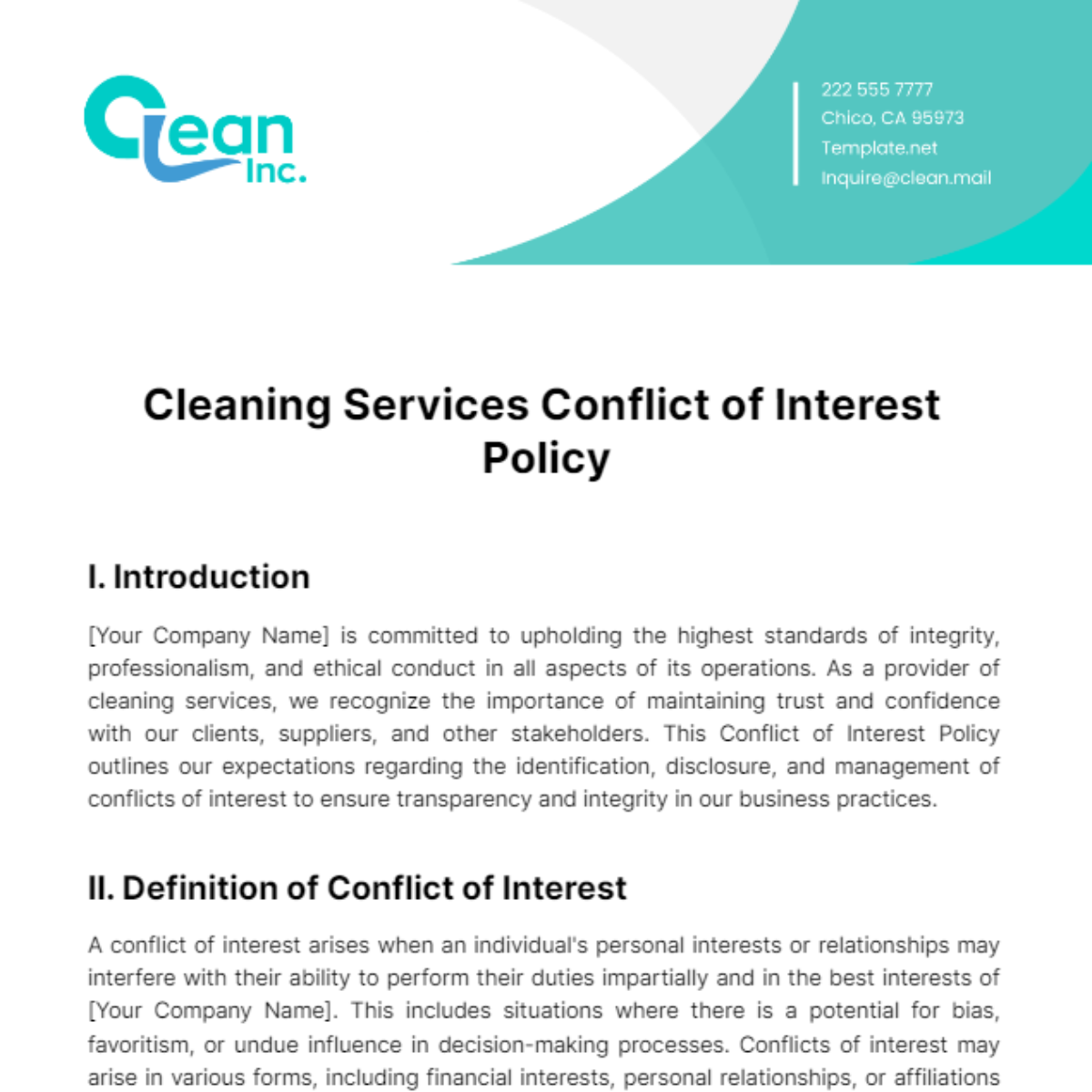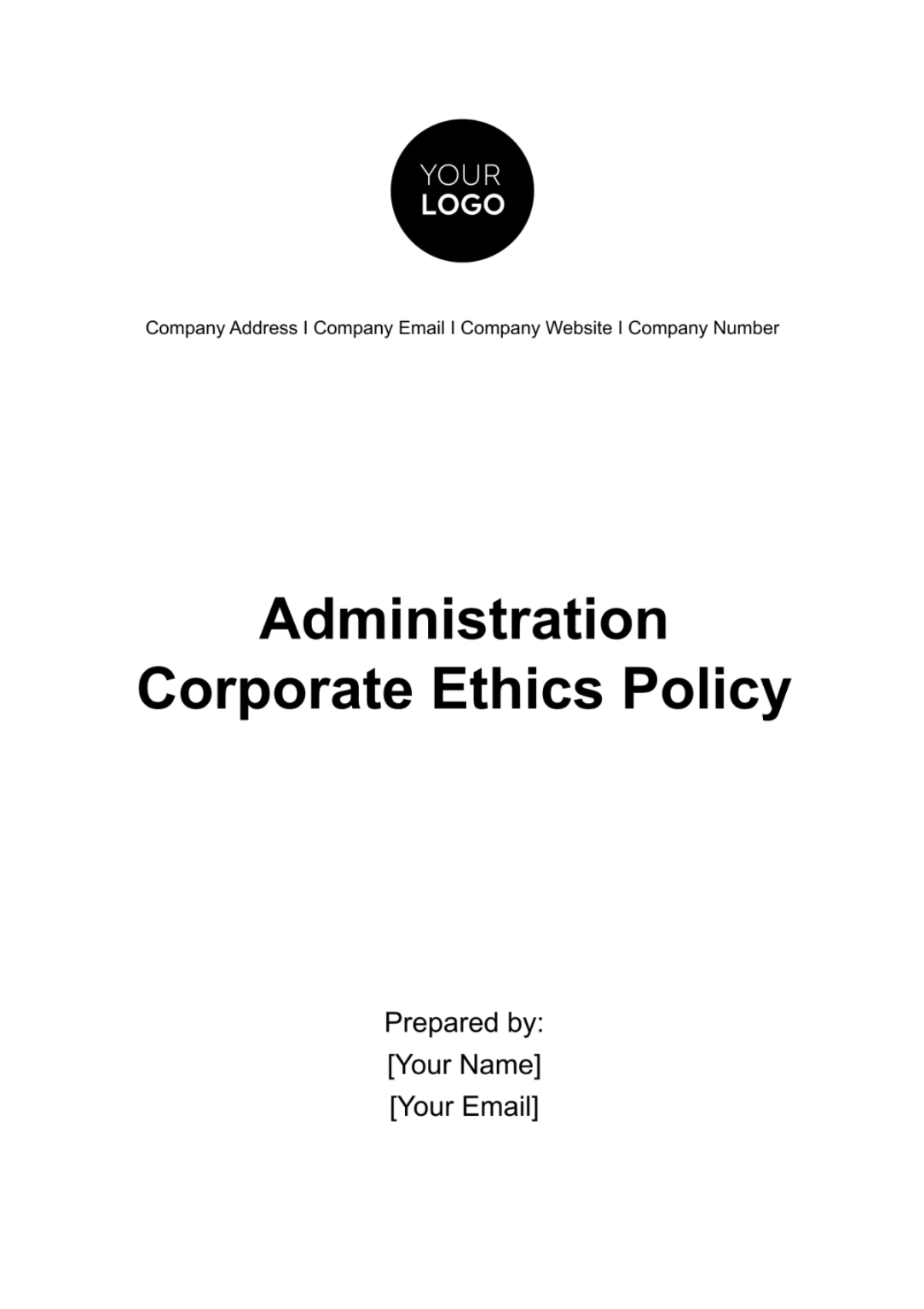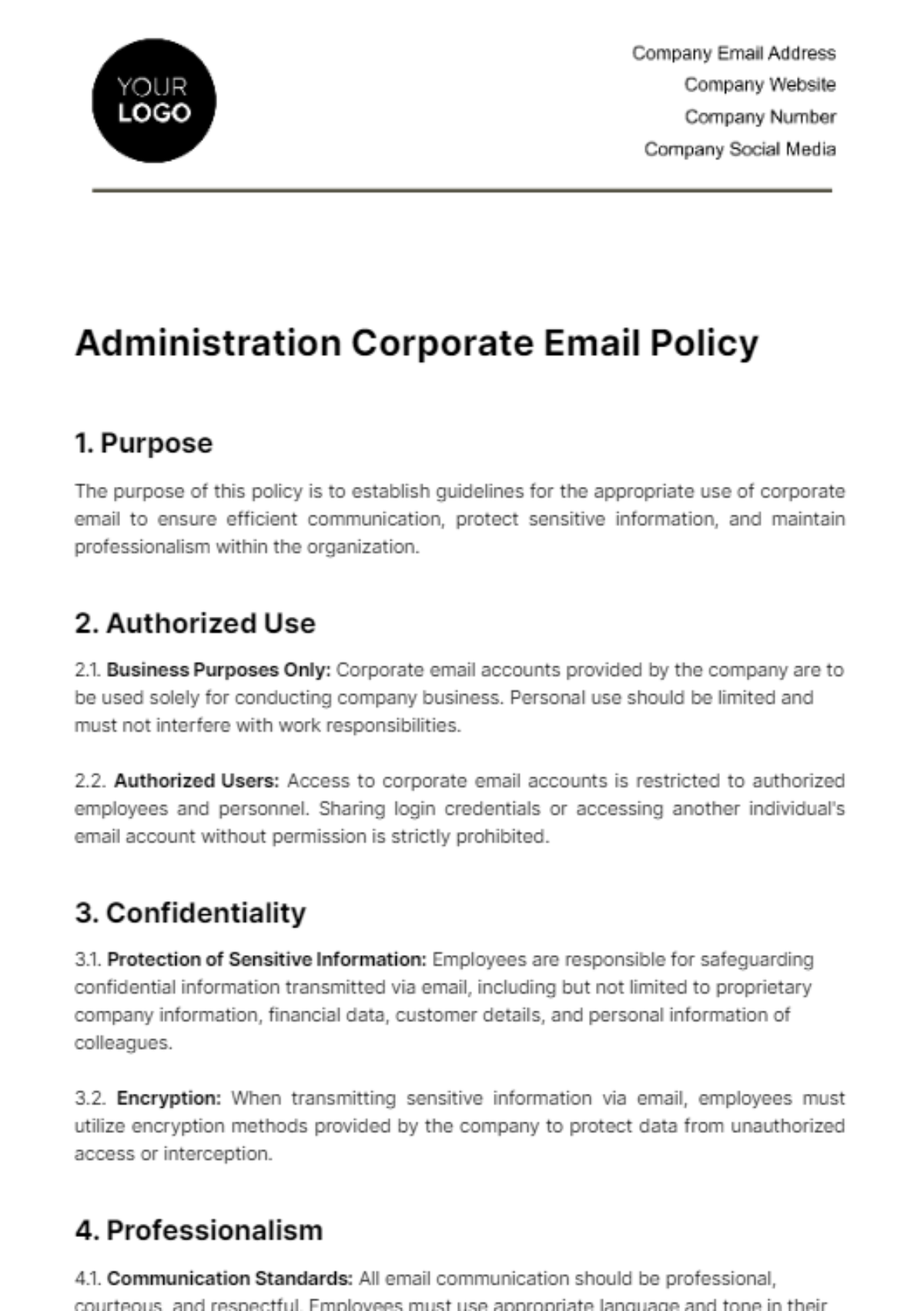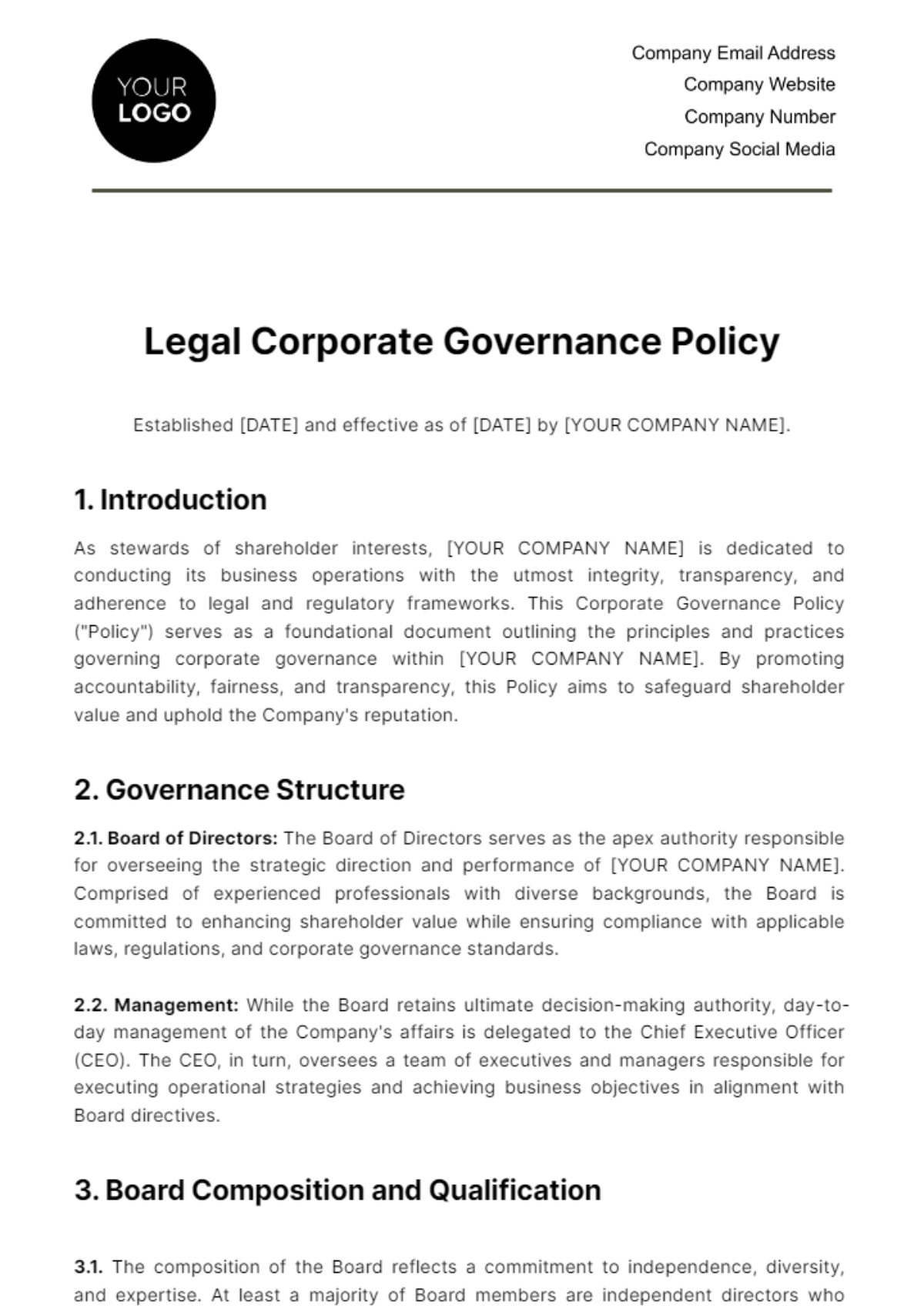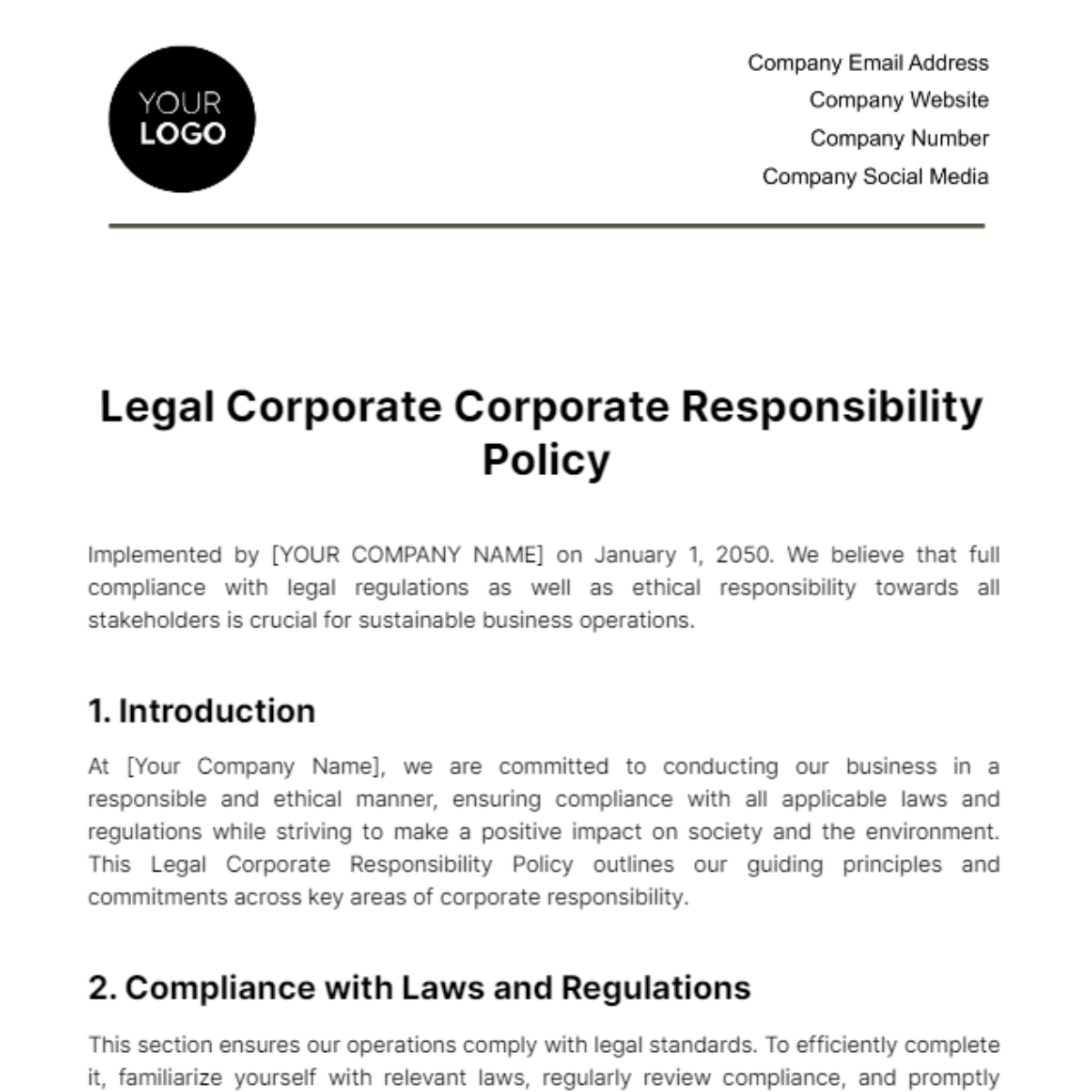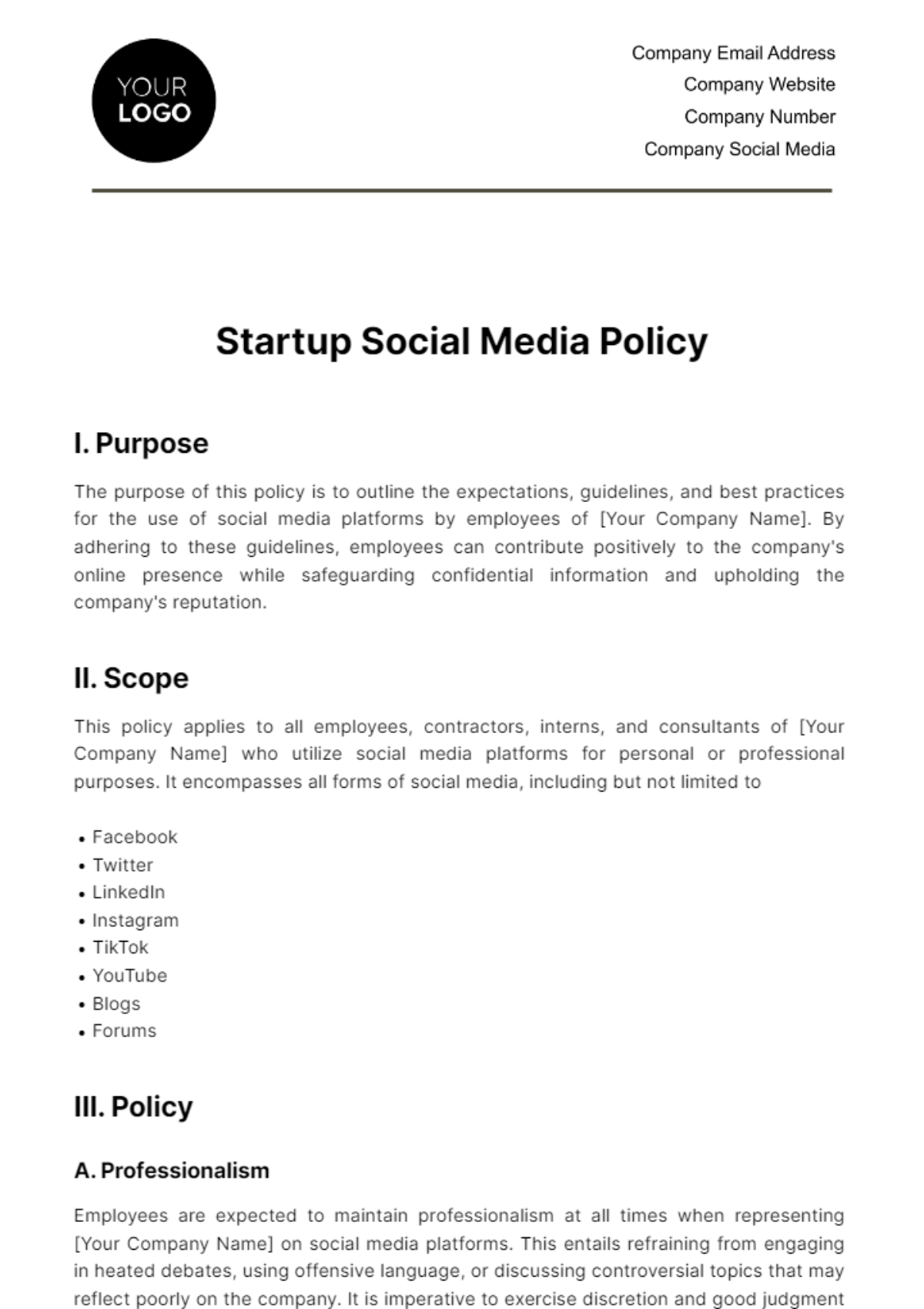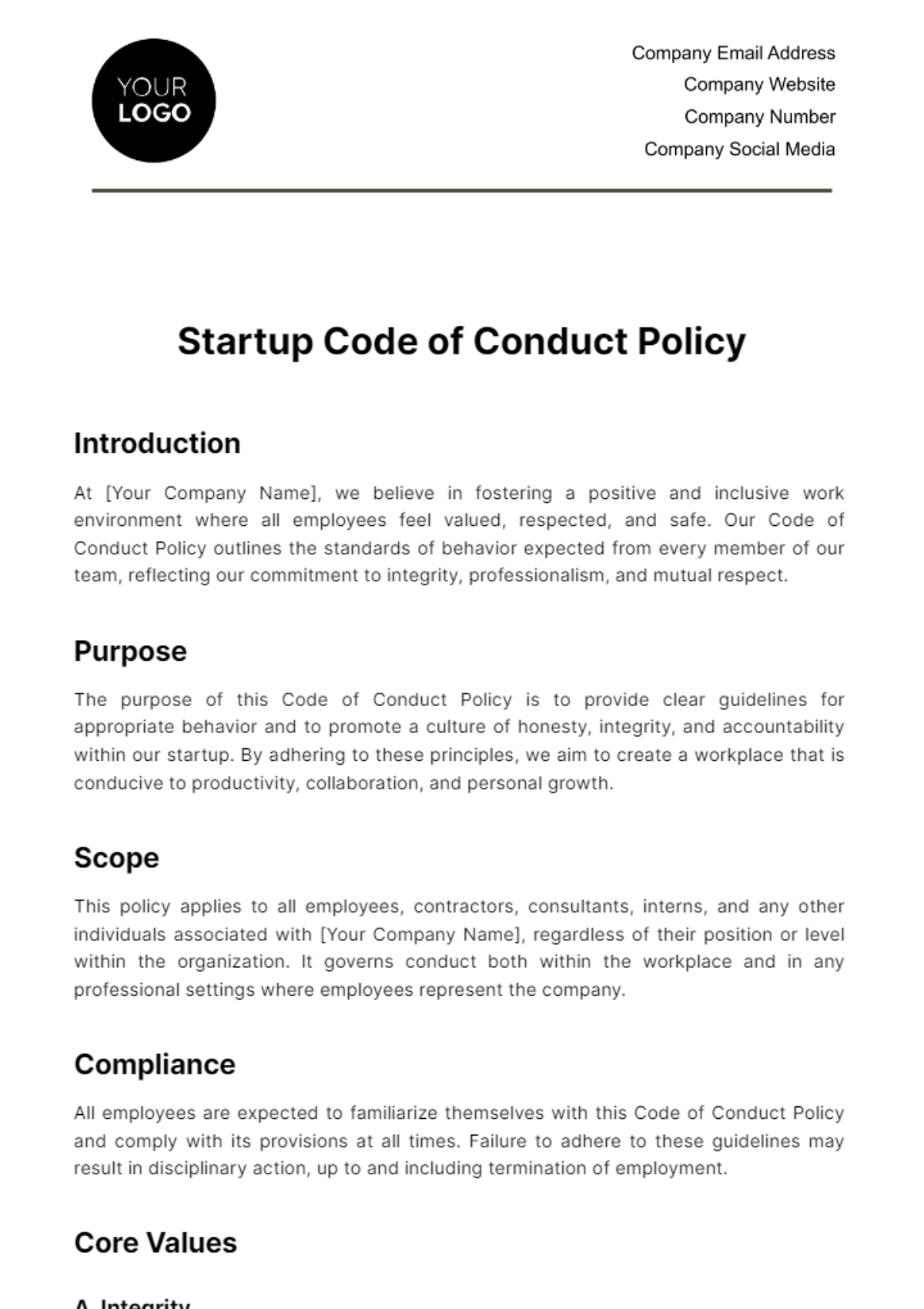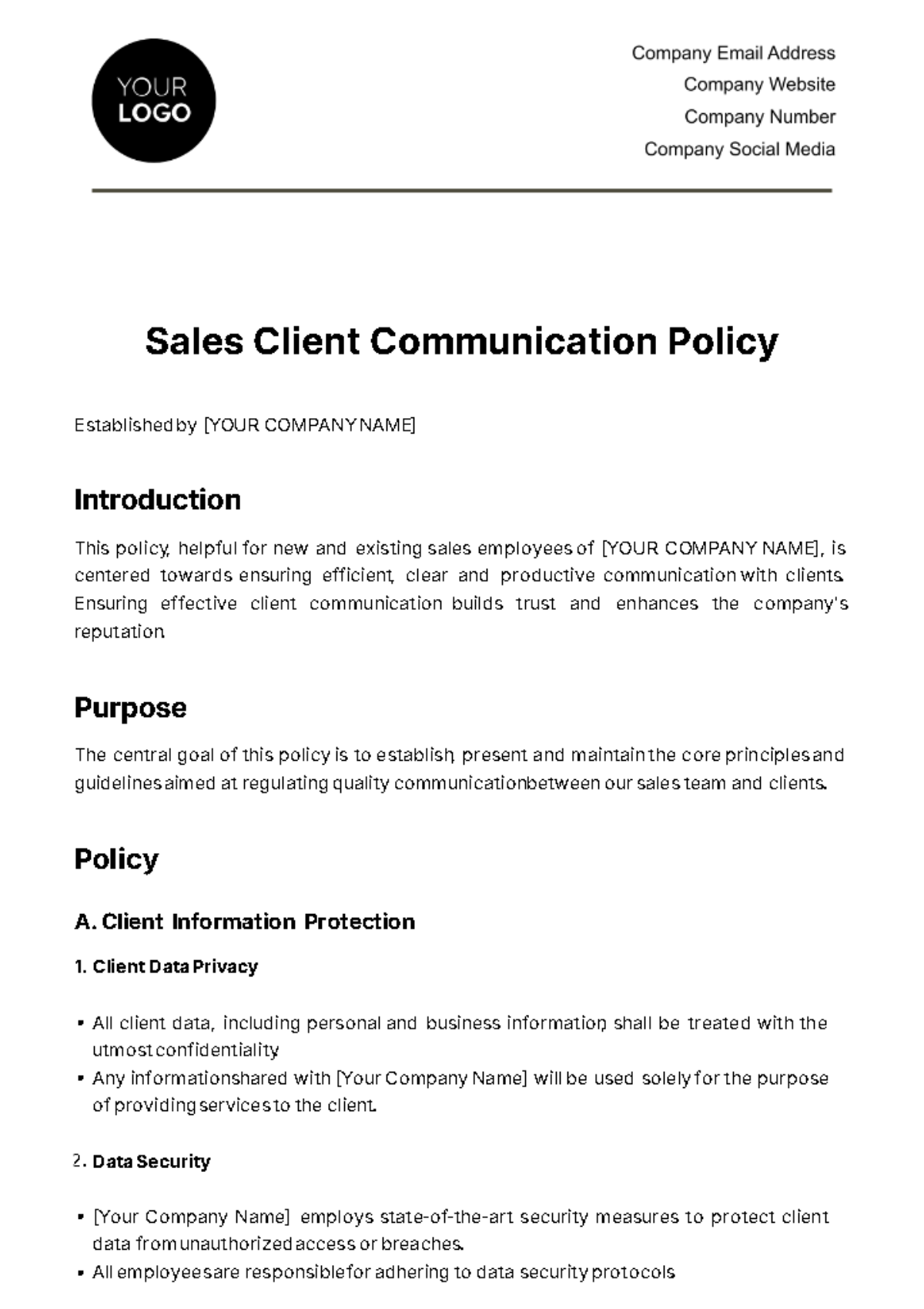Board of Director Policy
[Your Company Name]
Effective Date: January 1, 2050
Section I: Purpose and Scope
The purpose of this Board of Directors Policy is to establish a clear and effective framework within which the Board of Directors ("the Board") of [Your Company Name] operates. This policy aims to ensure that the organization adheres to best practices in governance, leadership, strategic oversight, and compliance. It provides detailed guidelines for the roles and responsibilities of the Board members, as well as for meeting procedures, performance evaluations, and the overall operational standards of the Board.
This document is designed to promote transparency, accountability, and integrity in [Your Company Name]'s governance. The effective functioning of the Board is paramount to guiding the organization towards its strategic goals and ensuring long-term sustainability. The policy applies to all Board members and outlines the expectations for their contributions to the company’s success.
Section II: Composition and Structure of the Board
A. Board Composition
Number of Members
The Board shall consist of a minimum of [5] and a maximum of [15] members. This range is intended to ensure a broad diversity of perspectives while maintaining efficient decision-making processes. The exact number will be determined based on the company’s size, industry complexity, and evolving strategic needs.Qualifications
Board members should possess a combination of skills and experience that are aligned with [Your Company Name]’s goals and objectives. Desired qualifications include:Proven expertise in corporate governance, risk management, or business law.
A strong background in financial oversight, including knowledge of auditing practices and internal controls.
Extensive experience in the industry or sector in which [Your Company Name] operates.
Proven leadership skills, including experience in senior executive roles or strategy development.
Knowledge of regulatory frameworks, including international regulations if applicable.
B. Diversity and Inclusion
[Your Company Name] is committed to creating a diverse and inclusive Board. A diverse Board contributes a wide array of perspectives that are crucial to sound decision-making. The company aims for gender, racial, cultural, professional, and geographic diversity in its Board composition. As of 2050, [Your Company Name] seeks to ensure that at least [40]% of Board members come from underrepresented groups.
C. Board Leadership
Chairperson
The Chairperson is responsible for the leadership of the Board, ensuring the smooth and effective operation of Board meetings, and ensuring that the Board is properly focused on strategic issues. The Chairperson will have the authority to set meeting agendas, represent the Board externally, and maintain close working relationships with the CEO. The Chairperson shall serve for a term of [3] years, with the possibility of reappointment based on Board approval.Vice-Chairperson
The Vice-Chairperson shall assist the Chairperson and assume their duties in the event of their absence or incapacity. The Vice-Chairperson will be expected to oversee specific areas of Board activity, such as governance improvements or stakeholder engagement strategies.Secretary
The Secretary is responsible for maintaining accurate records of all Board meetings, including minutes, attendance, and decisions made. Additionally, the Secretary ensures that all relevant policies, regulations, and compliance standards are being met. The Secretary shall also be responsible for notifying Board members of meetings and ensuring that required documents are distributed in advance.
Section III: Roles and Responsibilities
A. Fiduciary Duties
Board members owe three fundamental fiduciary duties to [Your Company Name]:
Duty of Care
Each Board member must act with the care, diligence, and skill that a reasonably prudent person would use in similar circumstances. This includes understanding the company's business model, financial health, and industry risks. Board members are expected to ask informed questions and seek expert advice when necessary.Duty of Loyalty
Board members must act in the best interest of [Your Company Name] at all times, avoiding conflicts of interest and placing the organization’s needs before personal or external interests. In situations where a conflict arises, the Board member must disclose it and recuse themselves from related discussions and votes.Duty of Obedience
Board members must ensure that [Your Company Name] complies with all relevant laws and regulations. They must ensure the company’s actions align with its mission, bylaws, and the decisions made by the Board.
B. Strategic Oversight
Mission, Vision, and Values
The Board is responsible for the approval, review, and alignment of [Your Company Name]'s mission, vision, and values with its long-term strategy. They must also ensure these elements are consistently communicated across the organization and integrated into daily operations.Strategic Plan
The Board is responsible for approving the company’s strategic goals for the next [5] years and overseeing their implementation. This includes setting annual targets, tracking progress, and adjusting the strategy as necessary in response to changing market conditions.Risk Oversight
The Board must identify, monitor, and mitigate significant risks, including financial, operational, and reputational risks. This may include the establishment of a dedicated Risk Committee to manage and report on key risk factors.
C. Financial Oversight
Budget Approval
The Board is responsible for approving the company’s annual budget, which will include expected revenue and expenditure projections. The budget should reflect the strategic priorities of the company and provide for adequate resources for growth and operational efficiency.Financial Reporting
The Board must ensure that financial statements are prepared in accordance with generally accepted accounting principles (GAAP) or international financial reporting standards (IFRS). Quarterly and annual financial reports should be reviewed and approved by the Board.External Audit
The Board oversees the selection and performance of an independent external audit firm. Auditors shall report directly to the Audit Committee, and the results of the audit shall be communicated to the entire Board.
D. CEO Appointment and Evaluation
CEO Appointment
The Board is responsible for selecting and appointing the CEO based on a thorough recruitment process that ensures the individual possesses the requisite skills and leadership qualities for the role. The Board must also set clear expectations for the CEO's performance and compensation.CEO Evaluation
The Board conducts an annual performance review of the CEO. This review is based on a set of agreed-upon criteria, which may include financial performance, leadership effectiveness, strategic implementation, and stakeholder engagement. A formal evaluation report is prepared and discussed with the CEO to guide future performance.
Section IV: Meeting Procedures
A. Schedule of Meetings
Regular Meetings
The Board shall meet at least [4] times per year, typically on a quarterly basis. The meetings will be scheduled well in advance, and a meeting calendar will be circulated at the start of each year to allow members to plan accordingly. These meetings will review the company’s performance, approve major initiatives, and discuss strategic decisionsSpecial Meetings
Special meetings may be called by the Chairperson, or upon written request by at least [3] members of the Board. These meetings are generally held in response to urgent matters that require immediate attention and decision-making.
B. Quorum and Voting
Quorum
A quorum for any Board meeting shall be constituted by the presence of at least [50]% of the total number of Board members. In the case of a special meeting, a quorum may be [66]% of Board members, depending on the urgency of the matter being discussed.Voting
Decisions at Board meetings will be made based on a majority vote of members present, unless otherwise stated in the company’s bylaws. In the event of a tie, the Chairperson has the casting vote.
Section V: Committees
A. Standing Committees
Audit Committee
The Audit Committee is responsible for overseeing [Your Company Name]'s financial integrity and transparency. It reviews the company’s financial statements, internal controls, and auditing processes. The Audit Committee will meet at least [2] times annually to review the company’s financial health and risk management strategies.Compensation Committee
This committee is tasked with overseeing the executive compensation structure, performance reviews, and benefits packages. The Compensation Committee meets at least [2] times annually to ensure that compensation levels are aligned with industry standards and company performance.Governance and Nominating Committee
This committee is responsible for evaluating Board performance, recommending new Board members, and reviewing the company’s governance policies. The committee meets at least [1] time annually to assess the Board's composition and to recommend improvements as necessary.
B. Ad Hoc Committees
Ad hoc committees may be established by the Board as needed for special projects or to address emerging issues. These committees are temporary and will cease once the specific project or issue has been resolved.
Section VI: Board Member Responsibilities
A. Attendance and Participation
Board members are expected to attend at least [75]% of scheduled Board meetings annually. Active participation in these meetings is critical for the success of [Your Company Name]. Members who fail to attend or participate without valid reasons for [two] consecutive meetings may face removal or suspension from the Board.
B. Confidentiality
Members of the Board must uphold the confidentiality of all proprietary, financial, and sensitive information obtained during their term. The breach of this confidentiality may result in removal from the Board and potential legal action. Board members must sign a confidentiality agreement upon joining the Board, which they must adhere to throughout their tenure.
C. Conflict of Interest
Board members must disclose any actual or potential conflicts of interest at the earliest opportunity. If a conflict arises, the member must recuse themselves from the relevant discussions and votes. This includes any personal, financial, or professional interests that may impact the member’s impartiality or the interests of [Your Company Name].
Section VII: Performance Evaluation
A. Individual Board Member Assessment
Each Board member is expected to participate in an annual self-assessment process. The self-assessment will evaluate each member's attendance, participation, and adherence to fiduciary responsibilities. Feedback from fellow Board members will also be incorporated to ensure comprehensive evaluations.
B. Board Performance Review
Every [3] years, [Your Company Name] will engage an independent consultant to conduct a comprehensive evaluation of the Board’s performance. The consultant’s report will address strengths and weaknesses in governance practices and provide recommendations for improvement. This ensures that the Board operates at its highest level of effectiveness.
Section IX: Remuneration and Expenses
A. Remuneration
Board members of [Your Company Name] will receive compensation for their valuable contributions to the governance of the company. The level of compensation reflects the level of responsibility, time commitment, and expertise required for effective Board participation. The compensation structure is as follows:
Annual Fixed Fees
Each Board member will receive an annual fixed fee of $[50,000]. This fee compensates members for attending meetings, reviewing reports, and engaging in strategic decision-making processes throughout the year.Chairperson Fee
The Chairperson, who holds a leadership role and is responsible for overseeing Board activities and driving the strategic direction of meetings, will receive a higher fee of $[75,000] annually. This reflects the additional responsibilities and time commitment required of the Chairperson.Committee Chair Fees
For Board members serving as the Chair of any standing committee (Audit, Compensation, Governance, etc.), an additional fee of $[10,000] will be provided annually for each committee chair role held. This fee acknowledges the extra effort in leading committee work and reporting to the full Board.Committee Member Fees
Board members who serve as regular members of any standing committee will receive a fee of $[5,000] per committee they are assigned to, ensuring that members are compensated for the time spent outside of regular Board meetings.Review of Compensation
The Board’s compensation structure will be reviewed every [2] years by the Compensation Committee to ensure it aligns with market trends and the company’s financial performance. Adjustments to remuneration may be made in response to industry norms, company profitability, or other key factors.
Role | Annual Fee |
|---|---|
Board Member | $50,000 |
Chairperson | $75,000 |
Committee Chair (per committee) | $10,000 |
Committee Member (per committee) | $5,000 |
B. Reimbursement of Expenses
Board members will be reimbursed for any reasonable expenses incurred while performing their duties, including but not limited to travel, accommodations, meals, and educational programs. All expenses must adhere to [Your Company Name]’s official expense policy, and Board members must submit detailed expense reports, including receipts, within [30] days of incurring the expense.
Travel Expenses
Board members will be reimbursed for round-trip airfare, train, or car travel for official meetings and events. The reimbursement will be based on standard class tickets, unless specific arrangements are made with prior approval.Accommodation
Members traveling for Board-related activities will be reimbursed for the cost of hotel accommodations at reasonable rates, in line with company policies.Meals and Incidentals
Meals and incidentals will be reimbursed at a daily maximum rate of $[150] per day. This includes meals during travel to Board meetings and any special meetings convened for company business.Training and Development
The company will cover the costs associated with Board members’ participation in professional development programs, such as governance training, industry conferences, or seminars. Reimbursement for such programs requires prior approval by the Board or the Governance Committee.
Expense Type | Reimbursement Details |
|---|---|
Travel (Airfare, Car, Train) | Standard class, pre-approved routes |
Accommodation | Reasonable rates based on policy |
Meals & Incidentals | $150 per day |
Professional Development | Pre-approved programs |
Section X: Reporting and Accountability
A. Annual Report
At the end of each fiscal year, the Board of Directors will produce an Annual Report to provide transparency to stakeholders about the company’s performance, strategic progress, and future direction. The report will be made available to shareholders, employees, and the public via [Your Company Website] and through other distribution channels as appropriate.
Content of the Annual Report
The Annual Report will contain the following key sections:Financial Statements: Including audited financial reports such as the balance sheet, income statement, and cash flow statement.
Corporate Governance: Detailing Board composition, committee activities, and governance improvements.
Strategic Initiatives: A summary of the company’s strategic goals for the year and how well they were achieved.
Risk Management: An overview of identified risks and how they were mitigated.
Sustainability and Corporate Social Responsibility: A section outlining the company’s efforts in environmental sustainability, community engagement, and corporate ethics.
Approval Process
The draft Annual Report will be presented to the Audit Committee for review and recommendations. Once finalized, it will be approved by the Board of Directors before being made available to the public.
B. Quarterly Reports
In addition to the Annual Report, [Your Company Name] will produce and distribute quarterly reports to provide stakeholders with timely updates on financial performance and key business activities. These reports will include:
Financial Performance: A review of the company’s earnings, expenses, and profits for the quarter, with comparisons to budgeted expectations.
Strategic Updates: Progress on strategic initiatives and any major developments impacting business operations.
Market Trends: An analysis of external factors that could influence the company’s performance, such as changes in regulations, economic conditions, or industry trends.
Section XI: Amendments to the Policy
This Board of Directors Policy is a living document and may be amended periodically to ensure it remains relevant and effective in meeting the evolving needs of [Your Company Name] and its stakeholders. The process for amending this policy is as follows:
Initiation of Amendments
Amendments to this policy may be proposed by any Board member, the Governance and Nominating Committee, or the CEO. Proposed amendments will be reviewed in the context of current governance practices, regulatory changes, and stakeholder feedback.Approval Process
Any proposed amendment to this policy must be approved by a two-thirds majority of the Board of Directors. The Governance and Nominating Committee will review the proposed changes and ensure they align with best practices before making recommendations to the full Board.Implementation of Amendments
Once approved, the amended policy will be disseminated to all Board members, senior executives, and other relevant stakeholders. Training will be conducted if necessary to ensure understanding of any significant changes.
Amendment Type | Approval Process |
|---|---|
Proposed by Board Members | Review by Governance Committee, two-thirds vote for approval |
Proposed by Governance Committee | Direct presentation to the full Board |
Effective Date of Amendments | Immediate upon approval and dissemination |
Section XII: Policy Implementation and Monitoring
A. Implementation
The successful implementation of this policy depends on clear communication, training, and monitoring by the Board. All Board members will be provided with a copy of the policy, and they will be required to sign an acknowledgment of receipt and understanding.
Onboarding Process
New Board members will be required to attend an onboarding session within [30] days of their appointment, where they will receive a thorough orientation on the company's governance framework, policies, and operational procedures. The session will include presentations by key executives, the Chairperson, and an external governance expert.Ongoing Monitoring
The Governance and Nominating Committee will oversee the continuous monitoring of the policy’s effectiveness. This includes tracking compliance with the policy and ensuring that Board members fulfill their duties as outlined.
B. Regular Reviews
The Board policy will undergo a full review every [3] years. The Governance and Nominating Committee will be responsible for overseeing the review process. The review will take into consideration any changes in governance standards, legal or regulatory requirements, and company needs. Based on the findings, recommendations for amendments may be proposed.
C. Reporting and Accountability
Annual Policy Review Report
Each year, a report will be generated by the Governance and Nominating Committee outlining compliance with the policy, any exceptions, and any recommendations for adjustments. This report will be presented at the first Board meeting following the end of each fiscal year.Ongoing Feedback Mechanism
[Your Company Name] will provide an avenue for Board members to submit feedback on the policy’s implementation. Feedback will be reviewed and addressed by the Governance and Nominating Committee as part of its ongoing monitoring and evaluation efforts.
Review Cycle | Frequency | Responsible Party |
|---|---|---|
Policy Review | Every 3 years | Governance and Nominating Committee |
Annual Compliance Report | Annually | Governance and Nominating Committee |
Feedback Collection and Review | Ongoing | Governance and Nominating Committee |





